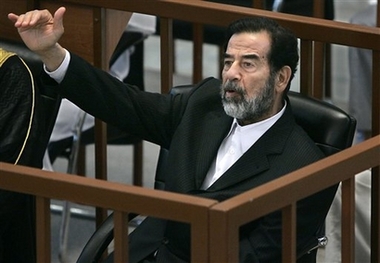The chief judge in Saddam Hussein's trial said Tuesday's session would be the
last day to hear defense witnesses, suggesting he wants to quickly wrap up the
proceedings despite defense complaints about being rushed.

Saddam Hussein testifies during his trial in
Baghdad, Iraq, Tuesday, June 13, 2006. Saddam and seven co-defendants are
on trial for torture, illegal arrests and the killing of nearly 150 people
from Dujail after a 1982 assassination attempt on Saddam in the
town. [AFP] |
One of Saddam's top co-defendants, Barzan Ibrahim, was absent after being
thrown out of the court the day before for arguing with chief judge Raouf
Abdel-Rahman. The judge said Tuesday that Ibrahim was being kept out "for his
violations against the order of the court."
Abdel-Rahman scolded the defense team, telling them to stop what he called
"political speeches."
"This is the last session to hear the testimony of defense witnesses," he
said. "We don't want speeches ... So chose one -- speeches or hearing
witnesses."
If Abdel-Rahman sticks to that stance, it could mean that the end of
proceedings is near in the nearly 8-month-old trial. After the defense witnesses
are finished, the prosecution and defense would present their closing statements
and the five-judge panel would adjourn to consider their verdicts.
Saddam and seven former members of his regime are charged with of crimes
against humanity for a crackdown against Shiites in the town of Dujail, which
was launched after a 1982 assassination attempt against the then-Iraqi leader.
They are accused of illegally arresting hundreds of Shiites -- including women
and children -- torturing some to death and killing 148 people who were
sentenced to death in the attack on Saddam.
They could face execution by hanging if convicted.
The court Tuesday heard a quick series of defense witnesses, including three
former bodyguards of Saddam who were with him on the day of the shooting attack
on his motorcade in Dujail. The witnesses testified anonymously from behind a
curtain to protect them from reprisals.
They said Saddam ordered his guards to stop firing back when gunmen in a
nearby palm grove shot at his car. "My understanding at that time the president
did not want ... even an animal in the groves to be hurt by the bodyguards'
fire," one of the witnesses said.
Another of the witnesses said some Dujail residents approached Saddam after
the attack "and they were crying to apologize. I remember, he told them, 'They
(the attackers) don't represent you, you are good people.'"
Tensions have grown in the court after the tough-talking Abdel-Rahman
effectively shut down a defense attempt to discredit the prosecution's case.
Last month, three witnesses testified that some of the 148 Shiites were still
alive and living in Dujail.
The defense argued that, if the claims were true, the prosecution's portrayal
of the crackdown was deeply flawed and that all the documents it presented
should be reviewed for accuracy.
Abdel-Rahman, however, had the three witnesses arrested for perjury, along
with a fourth witness who claimed that the chief prosecutor tried to bribe him
to testify against Saddam.